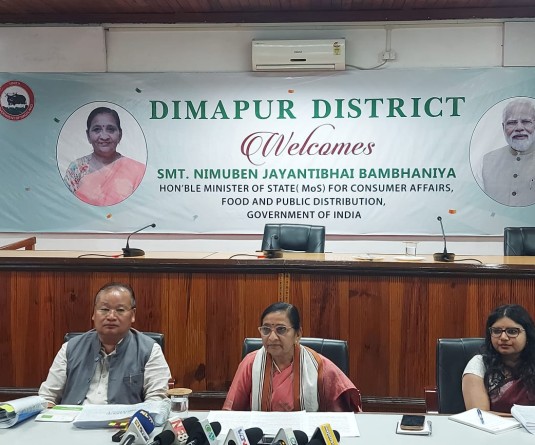
DIMAPUR, OCTOBER 11 (MExN): The Dimapur Chamber of Commerce and Industries (DCCI) has expressed deep concern regarding the current state of affairs for businesses in Dimapur, highlighting the immense difficulties stemming from what it described as an unregulated and unjustified taxation regime that has persisted for years.
In a press communiqué, the DCCI articulated the challenges faced by the business community, which is caught in a situation of double jeopardy due to the prevalence of multiple taxation and the practice of double taxation imposed by the municipal authority. It argued that these practices are severely undermining the local business ecosystem.
The DCCI lamented that on the one hand the GST regime is squeezing out a major chunk of business proceeds from the already exhausted and exploited business community, while on the other hand, the municipality has been imposing unregulated taxes and fees upon several businesses.
In this context, the DCCI pointed out several forms of collection, taxation and fees etc. are being extracted by the Municipal authority from businesses and services for which GST are already being paid. Such double taxation is unjustified and illegal.
Citing instance, the DCCI claimed that the municipal council has collected lakhs of rupees as tax from second hand clothes, which comes under GST. The DMC is also collecting Rs 1000 per month from every shop and agencies in the name of ‘Regulation fee.’ Recently the DMC also levied some few lakh rupees as one-time payment from shops selling decorative items for the ensuing festive season, it also alleged.
It specifically called attention to the collection of taxes, fees, and other charges by the Dimapur Municipal Council (DMC) on items for which GST is already being paid while terming such double taxation as unjustified and illegal.
The DCCI further criticized the DMC for its inconsistent approach to regulating perishable goods. While the council has not established fixed rates for these items, it continues to impose arbitrary taxes, it stated. For instance, the council collects Rs 500 from each Tata Mobile vehicle transporting tomatoes and an additional Rs 3 per kilo once the tomatoes reach the market. Similar practices are reported for other perishable items such as potatoes and onions, where taxes are collected without fixed pricing, leaving consumers vulnerable to vendor pricing.
Under such a scenario, the DMC which is responsible for rate-fixing and controlling prices, is encouraging syndicate system. And ultimately, the public are at the receiving end since they are directly or indirectly adversely affected by fluctuation in prices, it stated.
The DCCI expressed alarm over the non-adherence to the provisions of the recently enacted Nagaland Municipal Act 2023, particularly Section 124, which outlines the powers of municipalities to impose taxes, fees, and tolls. It emphasized that the DMC is operating in a manner that disregards these provisions.
Further, despite a standing government notification dated November 16, 2021, which ordered the cessation of any tax or fee collection on items covered under the GST regime by municipal and town councils throughout Nagaland, the DCCI claimed that the DMC continues to impose unregulated taxes and fees in violation of this directive.
While characterized these practices as illegal and unacceptable, it has called for immediate redress.
The DCCI warned that if such practices are allowed to continue in Dimapur, they could have cascading effects throughout the districts of Nagaland. It emphasized that the public should be aware that any taxation imposed ultimately affects citizens directly or indirectly.
As municipal councils operate under the state government, the DCCI urged that they should adhere to the Municipal Act and strive to alleviate the financial burden on the public.
In light of these challenges, the DCCI called on the government to take prompt action against any town or municipal council operating outside the law. It also urged the DMC to cease summoning groups of businesspeople or dealers, stressing that the business community should not be victimized for circumstances beyond their control.





